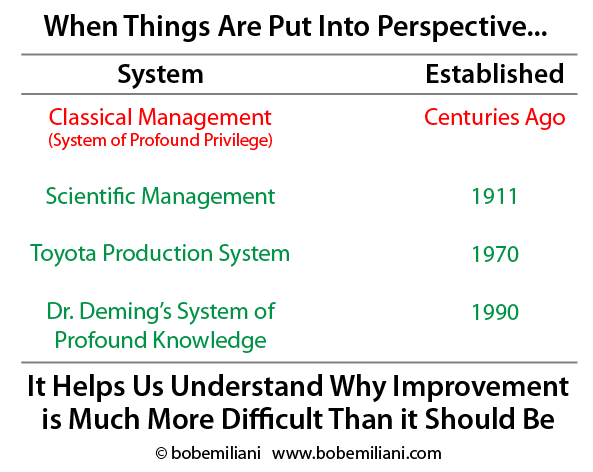People employed by companies have no understanding of where the company’s system of management came from. And they have no understanding of its quality relative to other systems of management. The lack of understanding results in a lack perspective. The image below adds needed perspective on the origin of classical management, used by most companies, and the much more recent forms of modern progressive management.

Classical management has a much longer history than the modern forms of progressive management. They are hours-old babies compared to the mature, antiquated classical management. So when you lament the struggles that you have faced in your efforts to modernize the practice of management, you can attribute it to the entrenched tradition of classical management. Unfortunately, the past exerts a much greater influence on the present one can imagine. But what, specifically, gives classical management the strength and power to so easily fend off competing management methods?
Management innovators such as Frederick Winslow Taylor, Taiichi Ohno, and W. Edwards Deming made heroic efforts to teach business leaders new ways of thinking, managing, and leading. Yet, classical management continues to prevail. CEOs, presidents, CFOs, COOs, etc., remain fully committed to classical management despite the existence of better management practices (SoPK, TPS, Agile, and so on). The question is, why?
In my book The Triumph of Classical Management Over Lean Management: How Tradition Prevails and What to Do About It, I explain the origins of classical management and why it remains the dominant management practice today despite better alternatives. The book dives deep into the details of the institution of business leadership, using Lean as the contrasting form of modern progressive management (SoPK, Agile, or other transformative management practice could easily be substituted). It identifies seven interconnected factors (economic, social, political, historical, philosophical, legal, and business) that assure the continuation of the status quo and, therefore, the avoidance of transformation to modern management practice.
If you have any interest in advancing the practice of management, you must read my book. If not, you will likely find, after much time and effort, that you have been “spinning your wheels.” Instead, read the book and learn what you are up against so that you can make needed corrections to your noble efforts to modernize the practice of management.
